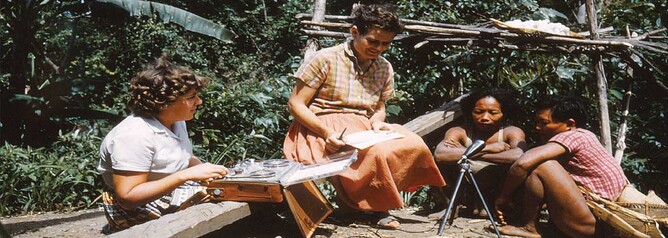(and there have been many!)
We are living in a world of constant change. It is hard to keep up with the pace at which things are changing. Sadly, many of the changes are not in keeping with Christian ethics or Biblical standards and values, but there are changes which are inevitable.
One advantage of being an octogenarian is having many decades over which to reminisce and note changes I’ve experienced. My first ‘missionary journey’ was to the Philippines in 1961, having completed two years at the Sydney Missionary Bible College and linguistic training. I joined the mission organisation then known as Gospel Recordings and was assigned as a Field Recordist to record Bible messages for the many languages spoken in the Philippines.
I traveled by the P&O ship Orsova and was the only occupant in a four-berth cabin. I had not travelled previously overseas, let alone by ship, and of course did not have a mobile phone! I carried with me a Nagra tape recorder which I didn’t have a clue how to use as I had not been given any training! Although commended by my home Assembly, I was not at that time listed in the AMT magazine because I had joined an organisation. I did not have pledged support, but went out trusting God to supply my needs, as this was also the Mission’s policy that “needs were made known only to God”.
I want to address some changes firstly that come to mind from the above paragraph.
It is very rare (if ever) nowadays that missionaries travel by ship to their area of service, as travelling by air is faster and more economical. However, many from our churches do travel on cruise ships today for holidays and enjoy the luxurious cabins, oodles of food and all that the cruises offer. It would be very rare to have a large cabin to yourself unless you were extremely rich — but of course, my cabin was on the lower deck!
Communication with ‘home’ was dependent on letters which often took three weeks for replies. After departing Sydney on my first journey, it was over three weeks before my parents knew of my safe arrival in Manila. Today, of course, with modern technology — mobile phones, internet, Skype — communication with home base is readily accessible from most locations in the world.
As my assignment was to record in the languages of the Philippines, I spent most of my time on board the ship learning how to operate the professional open reel analogue Nagra tape recorder. Today, only antique collectors of technical equipment would have heard of the Nagra! When completed, recordings made on reel tapes were sent to GR headquarters in Los Angeles, USA, where they were produced as 78rpm record discs and subsequently audio cassettes.
Records were replaced with audio cassettes which were mostly played on hand-wind players not requiring batteries and very little maintenance. These are still being used effectively in remote locations and small language groups. However, In this hi-tech digital age, huge changes have taken place with the introduction of CDs, DVDs, MP3s and USBs, and the list goes on. There is a down side in that modern technology requires batteries or electricity, or sun for solar power. This poses a problem for people living in remote areas who don’t want to walk long distances just to recharge their phones or players to listen to Christian messages. They cannot afford batteries and can’t waste money on buying these when they are hungry and need the basics of living.
As my major focus over the years has been to reach small language groups through analogue recordings, naturally it has been a huge challenge moving into the digital age with all the opportunities technology offers. My co-worker, Julie Loudon, and I continue the tedious task of digitising audio recordings for loading onto our website, primarily for the use of national workers.
In earlier years missionaries were expected to remain overseas for a stated number of years before taking a furlough or returning to the home country. My first term was for a minimum of three years, which was actually three and a half, before I could have my first furlough and see my parents. Some groups still retain such policies whilst others allow more flexibility. With the competitive pricing of air travel, many missionaries, depending on where they are located, travel quite frequently to their home country — even taking their holiday breaks, which sometimes is a lot cheaper than within their country of service. It is also evident that there has been a decrease in the number of long-term missionaries, and an increase in the numbers who make short-term mission trips or spend three or four shorter terms, often depending upon the needs of their children’s education or family situation.
Changes in modes of transport have been significant. In the early years of my missionary life, to reach remote language groups for recording could only be by days of walking the trails, riding in dug-out canoes, air-conditioned buses (no doors, no windows, bench seats), on logging trucks, bicycles, motorcycles, horse and trains. It was not so common for a missionary to have their own vehicle. However, in the last 30 or so years, most missionaries need and have their own vehicles for transport. Many of those located in isolated villages
would need to call upon the service of mission airplanes or helicopters for getting supplies and transport in and out.
In earlier years many mission groups were known as ‘Faith Missions’ following the pattern of George Mueller, believing that “God’s work done in God’s way would not lack God’s supply”. To this day many of us as Christian Assembly missionaries are still in this category. However, most mission societies require their members to raise a stipulated amount of pledged financial support for personal, travel, work and furlough needs prior to leaving their home country. With the ever increasing economic development and local population drawn to main towns and cities, fewer missionaries are living in the villages and so the cost of living is much higher.
Perhaps one of the surprising changes noticed is how some churches or chapels, at home as well as overseas, appeal for finances by holding raffles, auctions (a car was to be auctioned at one chapel we attended!) and fund-raising banquets. Members are challenged to bring their gold chains, rings and earrings to raise funds for a church building or mission project!
For many years I was able to go in and out of countries without restricted visas, but increasingly in the last thirty years or so more limitations and restrictions have been imposed, and some countries are no longer accessible.
With all the preaching and teaching over the years, it is evident that the Church has grown and developed Christian leaders and lay people who are now ministering ably and taking responsibility. Change also involves flexibility — being willing to make adjustments, to accommodate others or to help others in achieving their goals. By partnering with trusted and approved national workers, they can be more effective when given the resources to achieve their God-given goals. In most cases, lack of finances and material resources has limited their outreach. In fact, who better to reach their own people than those who understand the culture, language and needs!
No doubt in God’s economy and all part of His plan, many ethnic groups are migrating to western countries as part of the diaspora, and as never before there are wonderful opportunities for reaching many who would otherwise be ‘unreached’. The important question is whether we, in our own country, are taking advantage of this opportunity for making our Lord Jesus Christ known to those who are classified as migrants, asylum seekers and ‘new’ Australians.
Many of the countries and cities where I have worked have changed their names, and it is nearly impossible to keep up with churches and mission societies who also have chosen to merge or change their names.
So yes, change is inevitable and often necessary. As believers we need to be open to and willing to change. My initial ‘calling’ was to provide recordings of gospel messages and Bible teaching for non-readers. I never envisaged that after 40 years of constant travel in many countries, recording in indigenous languages, that I would become involved in humanitarian aid projects. In 2002 there was a terrible massacre of thousands in Nyankunde, in the north-east of Democratic Republic of Congo, where Julie Loudon and I had a base for the audio ministry outreach within the Community Emmanuel Brethren churches. We were faced with the challenge of helping to provide school fees for 300 children who were orphaned or with only one parent as a result of the massacre, and all had moved to a safe area. Up to that time we were focused on the audio ministry providing Bible teaching on recordings for non-readers, but then we were requested to be involved in humanitarian aid, both of which have continued to the present time. We have had a definite change in ministry as we continue to channel funds for children’s education. Through gifts from Australians, we have purchased land for resettling those internally displaced people (IDPs) from Nyankunde, building two primary schools, a secondary school, a medical dispensary and a maternity facility for them. A number of the IDPs are Pygmies who have fled ongoing conflict in the Ituri Forest, and many have come to faith in Christ.
With all the changes, the one constant which never changes is the faithfulness of God who has entrusted us as ‘change agents’ with the unchanging message which changes the lives of those who choose to believe. For the past 57 years it has been a privilege and a God-given responsibility to make the Lord Jesus Christ known. I continue to prove God’s faithfulness and am encouraged by the evident change that has been brought about in the lives of those who have chosen to walk in faith and obedience to Him.
There are still many open doors, boundless opportunities and a need for workers — “You also helping together with your prayers…Pray therefore to the Lord of the harvest that He will send forth more labourers.”
by Noela Elvery


